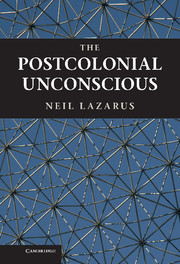Book contents
- Frontmatter
- Contents
- Acknowledgements
- Introduction: The political unconscious of postcolonial studies
- 1 The politics of postcolonial modernism
- 2 Fredric Jameson on ‘Third-World Literature’: a defence
- 3 ‘A figure glimpsed in a rear-view mirror’: the question of representation in ‘postcolonial’ fiction
- 4 Frantz Fanon after the ‘postcolonial prerogative’
- 5 The battle over Edward Said
- Notes
- Works cited
- Index
3 - ‘A figure glimpsed in a rear-view mirror’: the question of representation in ‘postcolonial’ fiction
Published online by Cambridge University Press: 05 June 2012
- Frontmatter
- Contents
- Acknowledgements
- Introduction: The political unconscious of postcolonial studies
- 1 The politics of postcolonial modernism
- 2 Fredric Jameson on ‘Third-World Literature’: a defence
- 3 ‘A figure glimpsed in a rear-view mirror’: the question of representation in ‘postcolonial’ fiction
- 4 Frantz Fanon after the ‘postcolonial prerogative’
- 5 The battle over Edward Said
- Notes
- Works cited
- Index
Summary
‘Representation’ is perhaps the single most fraught and contentious term within postcolonial studies. ‘Who is speaking?’ ‘Of and for whom?’ ‘How, where, and to what ends?’ ‘On what authority?’ ‘In which languages?’ ‘Through means of which concepts and categories?’ ‘On the basis of which problematics and epistemological assumptions?’ Like all revisionist modes of knowledge production, postcolonial studies has been centrally concerned with questions like this from the outset. It would not be too much to suggest, in fact, that one defining gesture of scholarship in the field has consisted precisely in its critique of a specific set of representations – those famously addressed by Edward Said under the rubric of ‘Orientalism’. Building upon Said's canonical formulation, scholars working in postcolonial studies have produced a considerable amount of valuable work over the past thirty-odd years on ‘western’ conceptions of the ‘non-West’, in which they have been concerned to demonstrate not only the falsity or inaccuracy of these conceptions but also their systematicity and their capacity to ground, engender, or constitute social practices, policies, and institutions.
There is, of course, no single theory of representation in postcolonial studies. However, I want to suggest that while the issue has been broached and thought about in a variety of different ways by different theorists, it has been somewhat fetishised in the scholarship. There has been a great deal of formidable philosophising, which has led to the elaboration of some rather grand and categorical propositions.
- Type
- Chapter
- Information
- The Postcolonial Unconscious , pp. 114 - 160Publisher: Cambridge University PressPrint publication year: 2011



